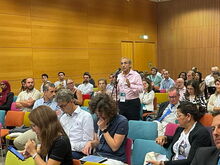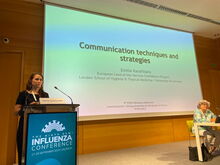Communication: Raising awareness on the burden of disease
Cynthia Tang
Scientific communication is critical for promoting scientific literacy and facilitating informed decision-making among the public. The session, “Communication: Raising Awareness on the Burden of Disease,” chaired by Stefania Maggi, National Research Council of Italy, emphasized the importance of increasing awareness of the impact of respiratory disease and offers strategies for effective communication. The session included lectures by Dr. Emilie Karafillakis, Assistant Professor and the European Director of the Vaccine Confidence Project, Dr. Frederic Bouder, University of Stavanger, Professor of Risk Management at the University of Stavange, and Dr. Ted van Essen, Chair of the Dutch Influenza Foundation.
Effective communication about vaccinations is highly complex. Dr. Karafillakis emphasized that specific strategies are necessary to approach individuals within the context of their beliefs, attitudes, and perceptions. She further shares that decision-making about vaccines are not always about the vaccines and their risks. Dr. Bouder presented studies demonstrating that socioeconomic, national, and political context are important factors that must be routinely studied. Furthermore, diseases, such as COVID-19 and influenza, should not be studied in isolation to understand the attitudes and perceptions about vaccinations. Dr. Van Essen further illustrated the changing landscape of public trust in physicians and healthcare institutions over time.
Healthcare workers play a crucial role in improving vaccination coverage and can help raise awareness and correct misconceptions. Providing concise and accurate information to healthcare workers is essential for appropriate vaccination recommendations to their patients. For example, the Dutch Influenza Foundation created the “European nurse information and communication guide on vaccines” and “Facts and fallacies about vaccination” guide to improve vaccination rates in both healthcare workers and the public. Dr. Van Essen also emphasizes the importance of autonomy, and individuals should feel that receiving the vaccine is ultimately their choice. Dr. Bouder additionally encourages more risk communication training for healthcare workers.
The media also has an influential role in improving vaccination rates and building trust. Dr. Karafillakis shared that the media can help vaccination campaigns through accurate reporting and prominent placement. Organizing pre-campaign briefing sessions for journalists may help prevent the media from reporting misinformation. Dr. Van Essen demonstrated the effectiveness of social media and news campaigns, events such as National Flu Day, and regular posts within an Influenza Hub Facebook community to increase influenza vaccine coverage.
The combination of these strategies also aims to build trust among the community. This includes offering transparency about the adverse effects of vaccinations, increasing science-focused communications that also evolve with changes in public trust, and improving our understanding of trust channels. Overall, raising awareness of the impact of respiratory diseases and implementing these strategies for effective communications can help us to build trust and improve vaccine coverage among the population.

